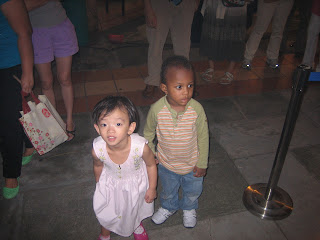It took traveling to the other side of the world to figure this out, and I still didn't make the connection at first.
Anyone who's lived with me knows that I love beans. I bought a pack of red ones my first time in a grocery store in Malaysia. The packaging said used in salads and desserts.
Red beans in sweets? I thought that odd, but gave it no further thought.
During Eid weekend, I discovered a new dessert, sweet and sticky rice rolls wrapped in banana leaves. I was intrigued by the black-eyed peas mixed in this delicious treat.
I would have never thought of sweetened back-eyed peas and rice. Amazing how we eat many of the same foods around the world but season or prepare them differently.
The other night I took the boys to a celebration commemorating the Chinese Mid-Autumn Festival in the shopping complex next to our condo. At one of the activity booths, children made mooncakes out of green and red beans. Different, I thought. (Can you guess where I am going with this.)
Traditionally eaten at the Chinese Mid-Autumn Festival, mooncakes were served to all the guests. Yahya and I gobbled up one slice after another as though we hadn't eaten cake in ages. Actually, it had been some time because we both try to avoid wheat flour because of allergies.
The mooncake was delicious, and I went home still thinking about it. I checked the internet for the ingredients, and of course they are made with wheat flour.
Later while doing the dishes, a mental snapshot of the online ingredients resurfaced: beans, oil, flour...
Like BEAN PIE!!!!
This Nation of Islam original (or not so original) wasn't that odd after all. Sweet bean paste has been used in Asian cuisine for centuries.
Nonetheless, from what I understand and imagine, the originators of the bean pie came up with their sweet creation independent of the mooncake. The commonality simply shows that great human minds think alike.
I will continue to proudly describe the bean pie to my students as Bilalians' contribution to Islamic culture and history.
Oh, I should rephrase that: African Americans' contribution.
But I use the term Bilalian to draw attention to an important period in the leadership of Imam W.D. Mohammed when he turned his followers from the teachings of his father Elijah Muhammad in the Nation of Islam to the Islam taught by the Prophet Muhammad, prayers and peace upon him.
Bilal was an African companion of the Prophet Muhammad. Formerly a slave, he was chosen to call the people to prayer with his beautiful voice. I imagine that Imam Mohammed chose the name Bilalian for his community so as to connect us to the Prophet Muhammad (now his followers instead of Elijah Muhammad's) and to charge us to aspire toward the high status and noble contribution of Bilal, with whom we shared African heritage.
Our community used the label for only a short period. One day I will have to tell my Bilalian stories and how as a little girl I thought that all black people called themselves Bilalian.
Edward Curtis highlights the term Bilalian in his chapter on Imam W.D. Mohammed in his book Islam in Black America, but otherwise, the term has very little online coverage. I invite any historians of Imam Mohammed's legacy to comment on the term, why it was chosen and abandoned.
But back to bean pie, my initial attitude toward the idea of beans used in sweets here in Asia shows how American I am. In the same way that Americans turn their nose up at the idea of bean pie, I almost did the same here even though I grew up eating the black Muslim version of sweet bean pastry with Breyers vanilla ice cream every Friday night (a post-jum'ah ritual).



I still fondly remember bean pie from once-upon-a-time in NC :)
ReplyDeleteI can relate to your discovery :). I had been Muslim for 2 years (at the age of 22) before ever eating bean pie. Once I tried...it was a pivotal experience. I gobbled down one slice after another as you describe. I was reluctant because I couldnt imagine the use of beans in anything sweet. Great piece as always. Jazaks.
ReplyDeleteLove the fact that bean pie is bringing this all together! One night this past Ramadan we went to iftar at a Panamanian restaurant owned by a nation of Islam couple, and in addition to the authentic Panamanian dishes they also had bean pie on their dessert menu. I got to enjoy a slice of bean pie after a long time and explain to the other people in our party the roots of bean pie in the African-American Muslim community.
ReplyDeleteNothing like warm bean pie and whipped cream
ReplyDelete